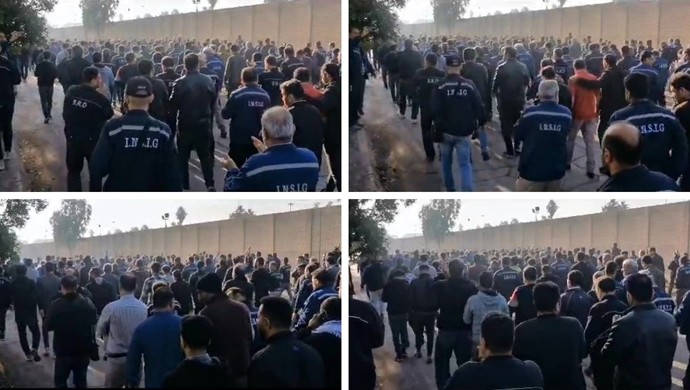
Workers of the Iran National Steel Industrial Group (INSIG) in Ahvaz marked their third consecutive day of strikes on Monday, as tensions heightened following the company’s decision to ban 21 workers from entering the premises and its failure to implement job classification rules.
The core issues fueling the unrest include calls for the reinstatement of suspended workers, the return of previously dismissed colleagues, wage parity with counterparts in neighboring steel companies, and the full and immediate enforcement of job classification laws.
Additionally, the workers demand the ousting of the CEO accused of corruption, the withdrawal of the state-run Bank-e Melli’s involvement, and a significant role for workers in the company’s management.
December 25—Ahvaz, southwest #Iran
Workers of Iran National Steel Industrial Group on strike for the third day after the company banned the entry of 21 workers to the company and refrained from implementing job classification rules.#IranProtestspic.twitter.com/1KnPFDabq4— People's Mojahedin Organization of Iran (PMOI/MEK) (@Mojahedineng) December 25, 2023
Amidst this backdrop, videos emerged of INSIG workers passionately chanting slogans like “we will not give in to disgrace” and “We are not afraid of threats and prison,” underlining their steadfast resolve.
The situation in Ahvaz is not isolated. The plight of Iranian workers appears to be worsening nationwide.
Concurrent with the INSIG strikes, there were disturbing reports from Chovar, Ilam province, where two petrochemical workers attempted suicide in response to declining living conditions and the announcement of worker layoffs. Fortunately, they were rescued and hospitalized. This incident follows a troubling pattern at the Chovar plant, where at least four workers have taken their own lives in the past two years due to dire working and living conditions.
December 25—Tehran, #Iran
The merchants of the gold bazaar on strike#IranProtestspic.twitter.com/A3Y9NlIxik— People's Mojahedin Organization of Iran (PMOI/MEK) (@Mojahedineng) December 25, 2023
Simultaneously, a wave of protests has swept across various sectors in Iran. Goldsmiths in several cities joined the strike movement, and nurses in Tehran rallied against poor working conditions, low pay, excessive and poorly compensated overtime, and the government’s neglect of tariff laws. Despite months of demonstrations, the regime’s response has been marked by repression rather than dialogue.
Additionally, government retirees and those from the Telecommunications Company of Iran (TCI) resumed protests in multiple cities, demanding pension increases in line with living costs. Accusations abound that the pension funds are nearing bankruptcy due to misappropriation by the regime for activities such as funding terrorism and bolstering its repressive apparatus.
December 25—Kermanshah, western #Iran
Retirees and pensioners of the Telecommunications Company of Iran rally to protest low pensions and poor living conditions.#IranProtestspic.twitter.com/xXAhxq2LyV— People's Mojahedin Organization of Iran (PMOI/MEK) (@Mojahedineng) December 25, 2023
Notably, the TCI is led by a former State Security Forces official and has shareholders with strong ties to the Revolutionary Guards (IRGC), reflecting a prioritization of the regime’s security agenda over the welfare of its employees and customers.
As these various protests converge, they underscore a broader crisis in Iran, where economic grievances, labor rights, and political discontent are increasingly intertwined.

MEK Iran (follow us on Twitter and Facebook), Maryam Rajavi’s on her site, Twitter & Facebook, NCRI (Twitter & Facebook), and People’s Mojahedin Organization of Iran – MEK IRAN – YouTu







